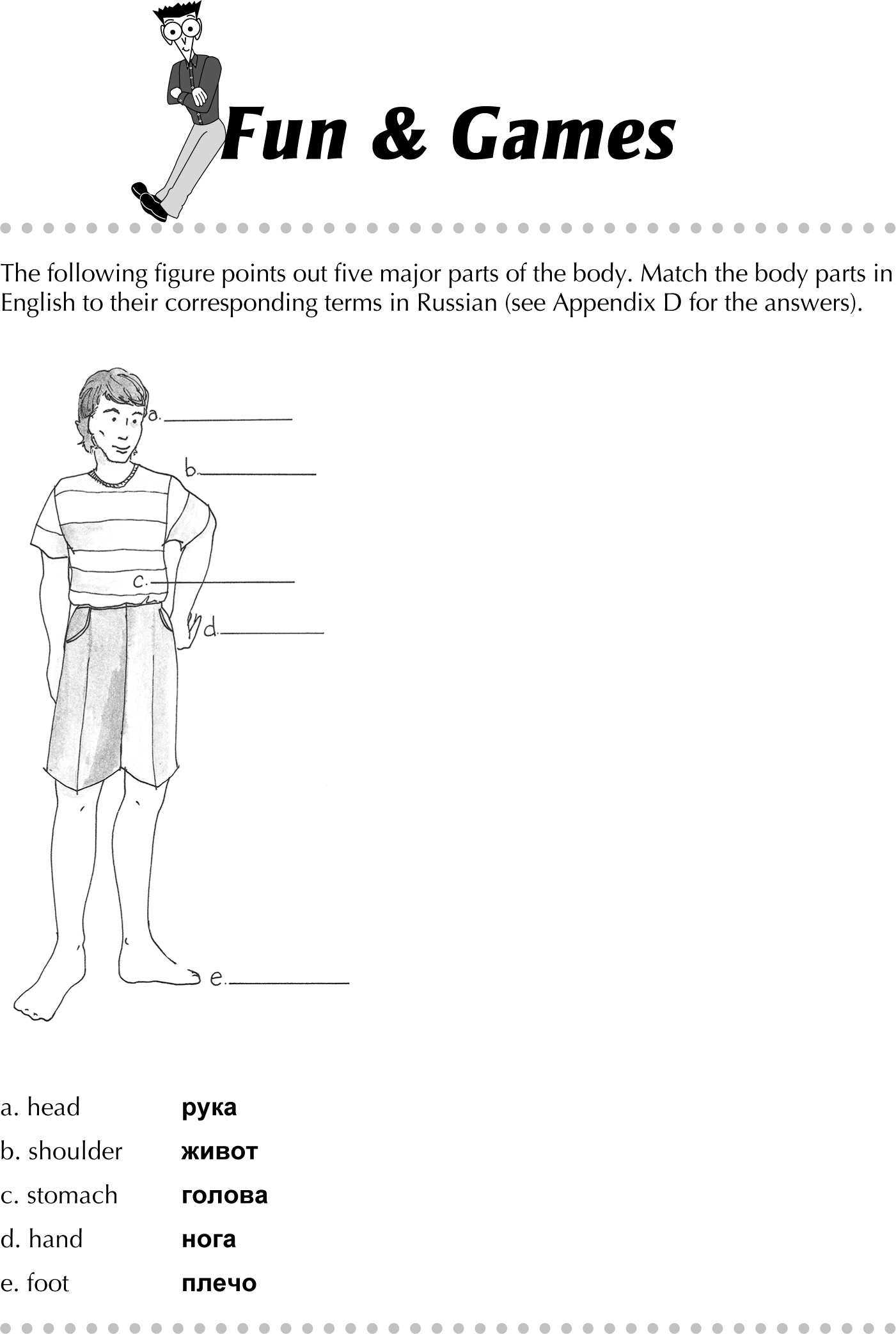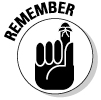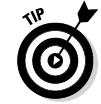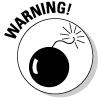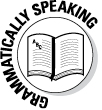Chapter 18
Handling Emergencies
In This Chapter
 Knowing how to ask for help
Knowing how to ask for help
 Getting medical attention
Getting medical attention
 Dealing with the police
Dealing with the police
An emergency would be called something else if it were possible to be fully prepared for it. However, you can avoid some panic if you have a convenient reference guide that gives you just the right things to say in case an emergency interrupts your plans. In this chapter, you find out how to explain yourself in various unpleasant situations: asking for help during an emergency, getting help with a health concern, and talking to the police. Enjoy this emergency guide; we hope you never need to use it!
Finding Help in Case of Accidents and Other Emergencies
Dealing with accidents and emergencies in your native language is enough of a headache; problems seem twice as bad when you have to speak a foreign language to resolve them. But if you know how to ask for help, chances are you’ll find somebody who makes resolving your problems much easier. In the following sections, you find out how to request help, call the Russian equivalent of 911, and explain your problem. And just in case your Russian fails you in a time of need, you discover the way to find somebody who speaks English!
Hollering for help
Извините, мне нужна помощь! (eez-vee-nee-tee, mnyeh noohzh-nah poh-mahsh’!) (Excuse me, I need help!)
Помогите мне, пожалуйста? (pah-mah-gee-tee mnyeh, pah-zhahl-stuh?) (Will you please help me?)
Make sure you explain what your problem is immediately after you ask for help so that the person you’re talking to doesn’t think you’re a scam artist. Phrases you may want to say include the following:
Я себя плохо чувствую. (ya see-bya ploh-khah choohs-tvooh-yooh.) (I am not feeling well.)
Мне плохо. (mnyeh ploh-khah.) (I am not feeling well.)
Позвоните в скорую помощь! (pahz-vah-nee-tee v skoh-rooh-yooh poh-mahsh’!) (Call an ambulance!)
Помогите! (pah-mah-gee-tee!) (Help!)
Позовите на помощь! (pah-zah-vee-tee nuh poh-mahsh’!) (Call for help!)
Позвоните в полицию! (pahz-vah-nee-tee f pah-lee-tsi-yooh!) (Call the police!)
Держите вора! (deer-zhi-tee voh-ruh!) (Stop the thief!)
Пожар! (pah-zhahr!) (Fire!)
Making an emergency phone call
 01: пожарная служба (pah-zhahr-nuh-yeh sloohzh-buh) (fire brigade)
01: пожарная служба (pah-zhahr-nuh-yeh sloohzh-buh) (fire brigade)
 02: полиция (pah-lee-tsi-yeh) (police)
02: полиция (pah-lee-tsi-yeh) (police)
 03: скорая помощь (skoh-ruh-yeh poh-mahsh’) (ambulance; Literally: urgent help)
03: скорая помощь (skoh-ruh-yeh poh-mahsh’) (ambulance; Literally: urgent help)
Reporting a problem
 произошёл (prah-ee-zah-shohl); masculine singular
произошёл (prah-ee-zah-shohl); masculine singular
 произошла (prah-ee-zah-shlah); feminine singular
произошла (prah-ee-zah-shlah); feminine singular
 произошло (prah-ee-zah-shloh); neuter singular
произошло (prah-ee-zah-shloh); neuter singular
 произошли (prah-ee-zah-shlee); plural
произошли (prah-ee-zah-shlee); plural
 авария (uh-vah-ree-yeh) (car accident)
авария (uh-vah-ree-yeh) (car accident)
 несчастный случай (nees-chahs-niy slooh-chuhy) (accident)
несчастный случай (nees-chahs-niy slooh-chuhy) (accident)
 пожар (pah-zhahr) (fire)
пожар (pah-zhahr) (fire)
 ограбление (ahg-ruhb-lyeh-nee-ee) (robbery)
ограбление (ahg-ruhb-lyeh-nee-ee) (robbery)
 отравление (aht-ruhv-lyeh-nee-ee) (poisoning)
отравление (aht-ruhv-lyeh-nee-ee) (poisoning)
 инфаркт (een-fahrkt) (heart attack)
инфаркт (een-fahrkt) (heart attack)
 ранение (ruh-nyeh-nee-ee) (injury)
ранение (ruh-nyeh-nee-ee) (injury)
If you’ve witnessed an accident, you may be asked one of these two interchangeable questions:
Что произошло? (shtoh prah-ee-zah-shloh?) (What happened?)
Что случилось? (shtoh slooh-chee-lahs’) (What happened?)
When responding to this question, you may want to say one of the following:
Здесь произошла авария. (zdyehs’ prah-ee-zahsh-lah uh-vah-ree-yeh.) (A car accident took place here.)
Здесь прозошёл несчастный случай. (zdyehs’ prah-ee-zah-shohl nees-chahs-niy slooh-chuhy.) (An accident took place here.)
Note that the verb agrees with the noun in gender.
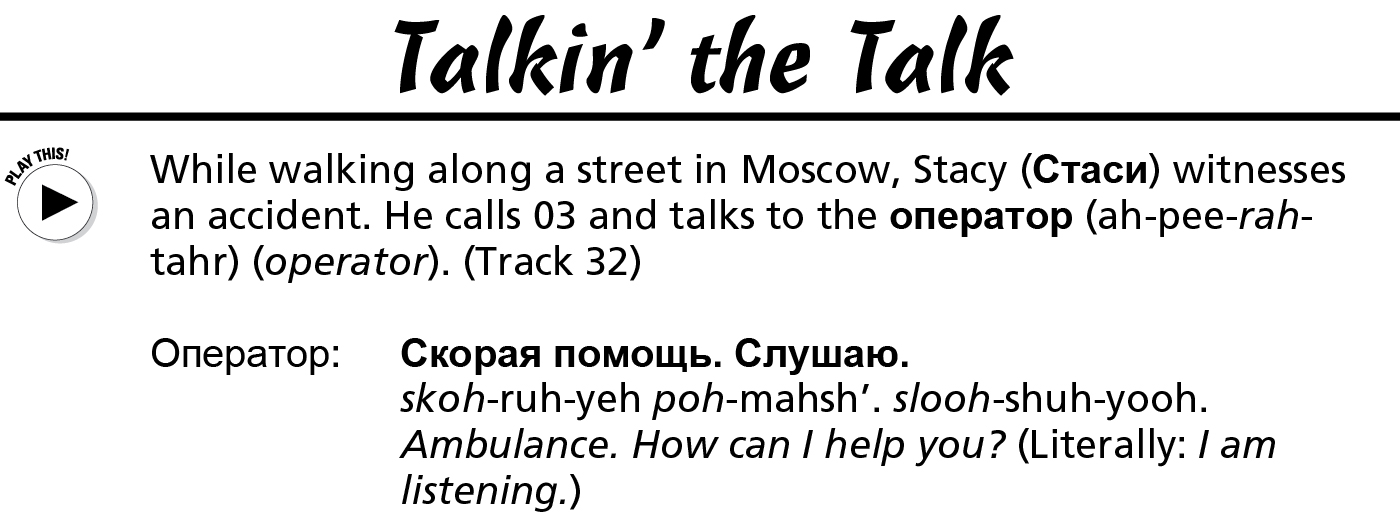
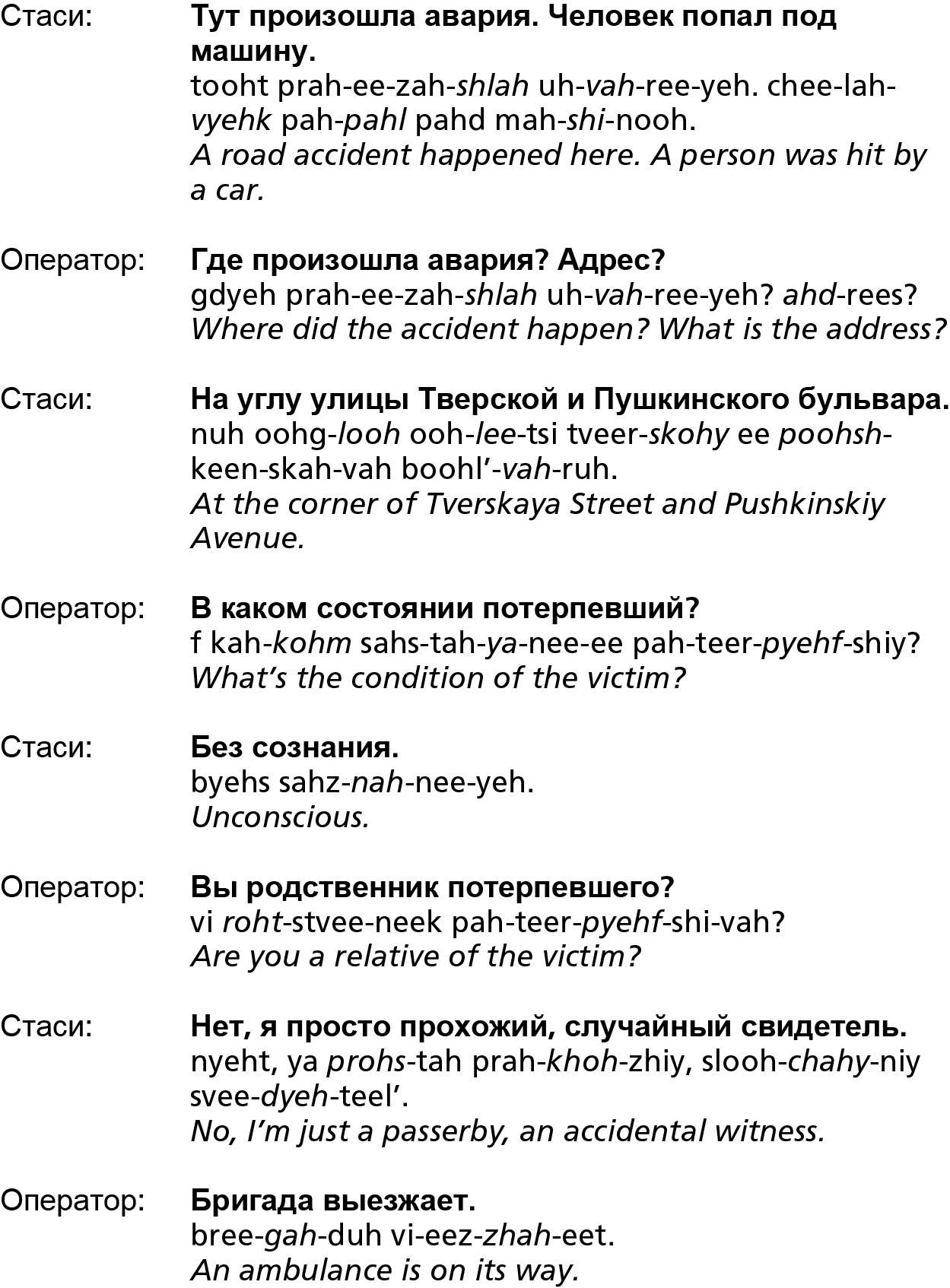

Requesting English-speaking help
In case you don’t feel like practicing your Russian in the midst of an emergency — or if you just want to speed up the process — you may want to ask for English-speaking help. The question you want to use is
Здесь есть кто-нибудь, кто говорит по-английски? (zdyehs’ yehst’ ktoh-nee-booht’, ktoh gah-vah-reet pah-uhng-leey-skee?) (Is there anybody here who speaks English?)
If you want to insist on finding somebody who can help you in English, say
Мне нужен кто-нибудь, кто говорит по-английски! (mnyeh nooh-zhehn ktoh-nee-booht’ ktoh guh-vah-reet pah-uhng-leey-skee!) (I need somebody who speaks English!)
If you’re making this request at a hospital or some other place staffed with highly educated people, you have a good chance of finding somebody who speaks English; many Russians study English in school and college.
American Clinic, 31 Grokholskij Pyeryeulok, 129090 Moscow; phone 095-937-5757; e-mail info@americanclinic.ru.
European Medical Center, 5 Spiridonievskiy Per., Bldg. 1, Moscow; phone 095-933-6655; e-mail emcinfo@emcmos.ru.
American Medical Clinic, Mojka Embankment #78, 190000 St.Petersburg; phone 812-740 2090, fax 812-310-4664; e-mail info@amclinic.ru.
Receiving Medical Care
If “an apple a day” doesn’t work, you may need to пойти к врачу (pahy-tee k vruh-chooh) (see a doctor). Every culture has different beliefs and procedures related to здоровье (zdah-rohv’-ee) (health) and медицина (mee-dee-tsi-nuh) (medicine), and knowing what they are before you visit a doctor helps. In the following sections, you find out how to talk about medical problems in Russian, how to understand your diagnosis, and what to say and do in a pharmacy.
Можно записаться на приём? (mohzh-nah zuh-pee-saht’-syeh nuh pree-yohm?) (Can I make an appointment?)

Knowing parts of the body
When you go to a doctor, you want to know how to talk about your тело (tyeh-lah) (body). In the following sections, we provide the Russian terms for visible body parts and internal organs.
Visible body parts
The following list names visible parts of the body from the top down:
 голова (gah-lah-vah) (head)
голова (gah-lah-vah) (head)
 шея (sheh-yeh (neck)
шея (sheh-yeh (neck)
 горло (gohr-lah) (throat)
горло (gohr-lah) (throat)
 плечо (plee-choh) (shoulder)
плечо (plee-choh) (shoulder)
 грудь (grooht’) (chest/breast)
грудь (grooht’) (chest/breast)
 спина (spee-nah) (back)
спина (spee-nah) (back)
 рука (rooh-kah) (arm/hand)
рука (rooh-kah) (arm/hand)
 локоть (loh-kaht’) (elbow)
локоть (loh-kaht’) (elbow)
 запястье (zuh-pyast’-ee) (wrist)
запястье (zuh-pyast’-ee) (wrist)
 палец (pah-leets) (finger)
палец (pah-leets) (finger)
 ногти (nohk-tee) (nails)
ногти (nohk-tee) (nails)
 живот (zhi-voht) (stomach)
живот (zhi-voht) (stomach)
 половые органы (pah-lah-vi-ee ohr-guh-ni) (genitals)
половые органы (pah-lah-vi-ee ohr-guh-ni) (genitals)
 нога (nah-gah) (leg/foot)
нога (nah-gah) (leg/foot)
 колено (kah-lyeh-nah) (knee)
колено (kah-lyeh-nah) (knee)
 лодыжка (lah-dish-kuh) (ankle)
лодыжка (lah-dish-kuh) (ankle)
 кожа (koh-zhuh) (skin)
кожа (koh-zhuh) (skin)
Parts of your head that you may seek treatment for include the following:
 лицо (lee-tsoh) (face)
лицо (lee-tsoh) (face)
 глаз (glahs) (eye)
глаз (glahs) (eye)
 ухо (ooh-khah) (ear)
ухо (ooh-khah) (ear)
 нос (nohs) (nose)
нос (nohs) (nose)
 рот (roht) (mouth)
рот (roht) (mouth)
 зуб (zoohp) (tooth)
зуб (zoohp) (tooth)
 язык (ee-zik) (tongue)
язык (ee-zik) (tongue)
 подбородок (pahd-bah-roh-dahk) (chin)
подбородок (pahd-bah-roh-dahk) (chin)
Internal organs
The internal organs you may need to talk about include these body parts:
 сердце (syehr-tseh) (heart)
сердце (syehr-tseh) (heart)
 печень (pyeh-cheen’) (liver)
печень (pyeh-cheen’) (liver)
 желудок (zhi-looh-dahk) (stomach)
желудок (zhi-looh-dahk) (stomach)
 мозг (mohzk) (brain)
мозг (mohzk) (brain)
 лёгкие (lyohkh-kee-ee) (lungs)
лёгкие (lyohkh-kee-ee) (lungs)
 кость (kohst’) (bone)
кость (kohst’) (bone)
 мышцы (mish-tsi) (muscles)
мышцы (mish-tsi) (muscles)
 почка (pohch-kuh) (kidney)
почка (pohch-kuh) (kidney)
 нервы (nyehr-vi) (nerves)
нервы (nyehr-vi) (nerves)
Describing your symptoms
The best way to start describing your symptoms if you’re in pain is with the verb болеть (bah-lyeht’) (to hurt): Say У меня болит . . . (ooh mee-nya bah- leet . . .) (. . . is hurting), adding the name of the organ that hurts in the nominative case (see Chapter 3 for details on cases).
You can also point to the place where it hurts and say
У меня болит здесь. (ooh mee-nya bah-leet zdyehs’.) (It hurts me here.)
You may want to specify whether it hurts внутри (vnooh-tree) (inside) or снаружи (snuh-rooh-zhee) (on the outside).
To describe other specific symptoms, you can say У меня . . . (ooh mee-nya . . .) (I have . . .) followed by one of the phrases from the following list:
 температура (teem-pee-ruh-tooh-ruh) (fever)
температура (teem-pee-ruh-tooh-ruh) (fever)
 понос (pah-nohs) (diarrhea)
понос (pah-nohs) (diarrhea)
 запор (zuh-pohr) (constipation)
запор (zuh-pohr) (constipation)
 тошнота (tahsh-nah-tah) (nausea)
тошнота (tahsh-nah-tah) (nausea)
 рвота (rvoh-tuh) (vomiting)
рвота (rvoh-tuh) (vomiting)
 головокружение (gah-lah-vah-krooh-zheh-nee-ee) (dizziness)
головокружение (gah-lah-vah-krooh-zheh-nee-ee) (dizziness)
 болит горло (bah-leet gohr-lah) (sore throat)
болит горло (bah-leet gohr-lah) (sore throat)
 болит голова (bah-leet gah-lah-vah) (headache)
болит голова (bah-leet gah-lah-vah) (headache)
 болит живот (bah-leet zhi-voht) (stomachache)
болит живот (bah-leet zhi-voht) (stomachache)
 болит ухо (bah-leet ooh-khuh) (earache)
болит ухо (bah-leet ooh-khuh) (earache)
 кашель (kah-sheel’) (cough)
кашель (kah-sheel’) (cough)
 насморк (nahs-mahrk) (runny nose)
насморк (nahs-mahrk) (runny nose)
 сыпь (sip’) (rash)
сыпь (sip’) (rash)
 ожог (ah-zhohk) (burn)
ожог (ah-zhohk) (burn)
 боль (bohl’) (pain)
боль (bohl’) (pain)
Understanding questions a doctor asks
The first question you hear from a врач (vrahch) (doctor) is usually one of these two:
Что у вас болит? (shtoh ooh vahs bah-leet?) (What is hurting you?)
Что вас беспокоит? (shtoh vahs bees-pah-koh-eet?) (What brought you here? Literally: What is bothering you?)
Your doctor will want to find out when the pain started to bother you by asking
Когда это началось? (kahg-dah eh-tah nuh-chuh-lohs’?) (When did it start?)
The doctor may also ask about your temperature:
Температура есть? (teem-pee-ruh-tooh-ruh yehst’?) (Do you have a fever?)
While examining you, the doctor may ask for specifics about your pain by asking
Здесь болит? (zdyehs’ bah-leet?) (Does it hurt here?)


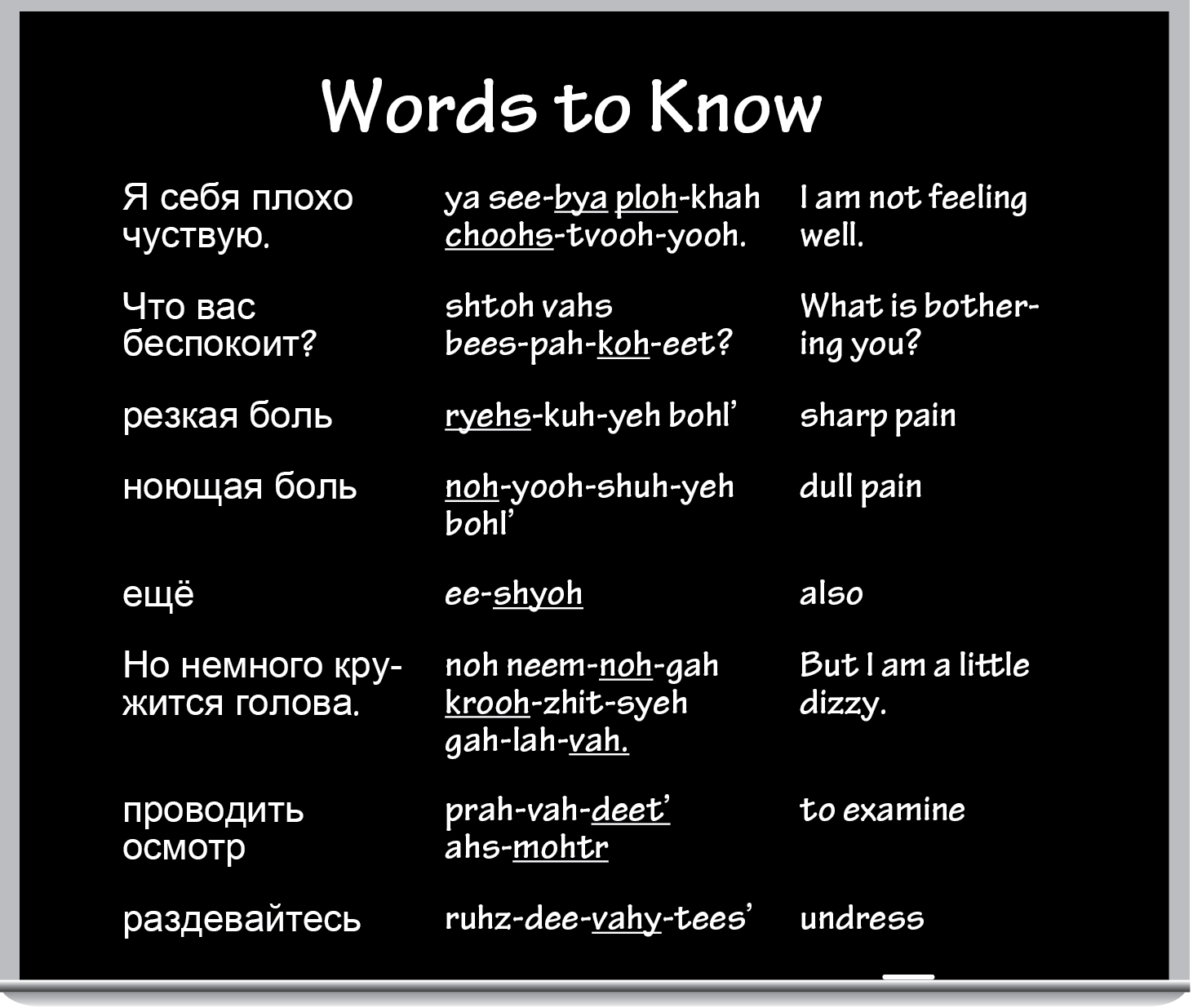
Communicating allergies or special conditions
 пенициллин (pee-nee-tsi-leen) (penicillin)
пенициллин (pee-nee-tsi-leen) (penicillin)
 орехи (ah-ryeh-khee) (nuts)
орехи (ah-ryeh-khee) (nuts)
 обезболивающие (ah-beez-boh-lee-vuh-yooh-shee-ee) (painkillers)
обезболивающие (ah-beez-boh-lee-vuh-yooh-shee-ee) (painkillers)
 укус пчелы (ooh-koohs pchee-li) (bee stings)
укус пчелы (ooh-koohs pchee-li) (bee stings)
 кошки (kohsh-kee) (cats)
кошки (kohsh-kee) (cats)
 собаки (sah-bah-kee) (dogs)
собаки (sah-bah-kee) (dogs)
 яйца (yay-tsuh) (eggs)
яйца (yay-tsuh) (eggs)
 пыльца (pil’-tsah) (pollen)
пыльца (pil’-tsah) (pollen)
 молоко (mah-lah-koh) (milk)
молоко (mah-lah-koh) (milk)
 моллюски (mah-lyoohs-kee) (shellfish)
моллюски (mah-lyoohs-kee) (shellfish)
 рыба (ri-buh) (fish)
рыба (ri-buh) (fish)
У меня астма. (ooh mee-nya ahst-muh.) (I have asthma.)
Я эпилептик. (ya eh-pee-lyehp-teek.) (I have epilepsy.)
Я диабетик. (ya dee-uh-byeh-teek.) (I have diabetes.)
Я беременна. (ya bee-ryeh-mee-nuh-yeh.) (I am pregnant.)
Seeing a specialist
In Russia, each doctor specializes in a type of organ (for instance, the skin, bones, or nerves). If you go to a Russian physician and say that your foot hurts, he doesn’t send you to a foot doctor. Instead, he finds out what type of problem you have and then sends you to a дерматолог (dehr-muh-toh-lahk) (dermatologist) if your problem concerns the skin of your foot, to a хирург (khee-roohrk) (surgeon) if you’ve broken a bone in your foot, or to a невропатолог (neev-rah-puh-toh-lahk) (neurologist) if your problem stems from nerve connections.
Some other doctors and their areas of specialization include
 ухо/горло/нос (ooh-khah/gohr-la/nohs) (ear/throat/nose)
ухо/горло/нос (ooh-khah/gohr-la/nohs) (ear/throat/nose)
 дантист (duhn-teest) (dentist)
дантист (duhn-teest) (dentist)
 венеролог (vee-nee-roh-lahk) (a specialist in venereal diseases)
венеролог (vee-nee-roh-lahk) (a specialist in venereal diseases)
 терапевт (tee-ruh-pyehft) (internist)
терапевт (tee-ruh-pyehft) (internist)
 глазной врач (gluhz-nohy vrahch) (eye doctor)
глазной врач (gluhz-nohy vrahch) (eye doctor)
 гинеколог (gee-nee-koh-lahk) (gynecologist/obstetrician)
гинеколог (gee-nee-koh-lahk) (gynecologist/obstetrician)
 ортопед (ahr-tah-pyeht) (orthopedist)
ортопед (ahr-tah-pyeht) (orthopedist)
 педиатр (pee-dee-ahtr) (pediatrician)
педиатр (pee-dee-ahtr) (pediatrician)
 психиатр (psee-khee-ahtr) (psychiatrist)
психиатр (psee-khee-ahtr) (psychiatrist)
 кардиолог (kuhr-dee-oh-lahk) (cardiologist)
кардиолог (kuhr-dee-oh-lahk) (cardiologist)
Undergoing an examination and getting a diagnosis
During a medical examination, you may hear the following phrases:
Разденьтесь до пояса. (ruhz-dyehn’-tees’ dah poh-ee-suh.) (Undress from your waist up.)
Разденьтесь полностью. (ruhz-dyehn’-tees’ pohl-nahst’-yooh.) (Take off all your clothes.)
Закатите рукав. (zuh-kuh-tee-tee rooh-kahf.) (Please roll up your sleeve.)
Глубоко вдохните. (glooh-bah-koh vdahkh-nee-tee.) (Take a deep breath.)
Ложитесь. (lah-zhi-tees’.) (Please lie down.)
Откройте рот. (aht-krohy-tee roht.) (Open your mouth.)
Покажите язык. (pah-kuh-zhi-tee ee-zik.) (Stick out your tongue.)
You also may have to undergo the following tests:
 анализ крови (uh-nah-lees kroh-vee) (blood test)
анализ крови (uh-nah-lees kroh-vee) (blood test)
 анализ мочи (uh-nah-lees mah-chee) (urine test)
анализ мочи (uh-nah-lees mah-chee) (urine test)
 рентген (reen-gyehn) (X-ray)
рентген (reen-gyehn) (X-ray)
 электрокардиограмма (eh-lyehkt-rah-kuhr-dee-ahg-rah-muh) (electrocardiogram)
электрокардиограмма (eh-lyehkt-rah-kuhr-dee-ahg-rah-muh) (electrocardiogram)
 сонограмма (sah-nah-grah-muh) (sonogram)
сонограмма (sah-nah-grah-muh) (sonogram)
 ультразвук (oohl’-truh-zvoohk) (ultrasound)
ультразвук (oohl’-truh-zvoohk) (ultrasound)
After all the turmoil of going through the осмотр (ahs-mohtr) (medical examination), you’re ready to hear your диагноз (dee-ahg-nahs) (diagnosis). The doctor will probably phrase it this way: У вас . . . (ooh vahs . . .) (You have . . .) plus the diagnosis itself. For instance, you may hear that you have one of the following:
 простуда (prahs-tooh-duh) (cold)
простуда (prahs-tooh-duh) (cold)
 ангина (uhn-gee-nuh) (sore throat)
ангина (uhn-gee-nuh) (sore throat)
 грипп (greep) (flu)
грипп (greep) (flu)
 бронхит (brahn-kheet) (bronchitis)
бронхит (brahn-kheet) (bronchitis)
 инфекция (een-fyehk-tsi-yeh) (infection)
инфекция (een-fyehk-tsi-yeh) (infection)
 пневмония (pneev-mah-nee-yeh) (pneumonia)
пневмония (pneev-mah-nee-yeh) (pneumonia)
 сенная лихорадка (syeh-nah-yeh lee-khah-raht-kuh) (hay fever)
сенная лихорадка (syeh-nah-yeh lee-khah-raht-kuh) (hay fever)
 растяжение связок (ruhs-tee-zheh-nee-ee svya-zahk) (sprain)
растяжение связок (ruhs-tee-zheh-nee-ee svya-zahk) (sprain)
А что у меня? (ah shtoh ooh mee-nya?) (What do I have?)
If the doctor recommends that you go to the ложиться в больницу (lah-zhit’-syeh v bahl’-nee-tsooh) (hospital), you have a more serious condition. Maybe you have аппендицит (ah-peen-dee-tsit) (appendicitis), перелом (pee-ree-lohm) (a broken bone), or пищевое отравление (pee-shee-voh-ee aht-ruhv-lyeh-nee-ee) (food poisoning).
Your doctor may recommend that you ходить на процедуры (khah-deet’ nuh prah-tsi-dooh-ri) (take treatment). This type of recommendation doesn’t necessarily imply that you have to stay at the hospital; you may need to come to the hospital daily or several times a week for a certain type of treatment. In this case, the doctor gives you a направление (nuh-pruhv-lyeh-nee-ee) (written treatment authorization).
Visiting a pharmacy
In most cases, a doctor will прописать лекарство (prah-pee-saht’ lee-kahrst-vah) (prescribe medicine) for you. The Russian word for prescription is рецепт (ree-tsehpt).
To get your лекарство, you need to go to the аптека (uhp-tyeh-kuh) (pharmacy). Unlike in the United States, a Russian pharmacy isn’t usually part of a big department store; it’s a separate little store where only medicine is sold. To get your лекaрство, you simply hand your рецепт to the аптекарь (uhp-tyeh-kuhr’) (pharmacist).
Some common medicines include
 нейтрализующее кислоту средство (neey-truh-lee-zooh-yooh-shee-ee kees-lah-tooh sryehts-tvah) (antacid)
нейтрализующее кислоту средство (neey-truh-lee-zooh-yooh-shee-ee kees-lah-tooh sryehts-tvah) (antacid)
 аспирин (uhs-pee-reen) (aspirin)
аспирин (uhs-pee-reen) (aspirin)
 капли от кашля (kahp-lee aht kahsh-lyeh) (cough drops)
капли от кашля (kahp-lee aht kahsh-lyeh) (cough drops)
 сироп от кашля (see-rohp aht kahsh-lyeh) (cough syrup)
сироп от кашля (see-rohp aht kahsh-lyeh) (cough syrup)
 средство для снижения температуры (sryehts-tvah dlya snee-zheh-nee-yeh teem-pee-ruh-tooh-ri) (fever reducer)
средство для снижения температуры (sryehts-tvah dlya snee-zheh-nee-yeh teem-pee-ruh-tooh-ri) (fever reducer)
 болеутоляющее (bah-lee-ooh-tah-lya-yooh-shee-ee) (pain reliever)
болеутоляющее (bah-lee-ooh-tah-lya-yooh-shee-ee) (pain reliever)
 средство от изжоги (sryehts-tvah aht eez-zhoh-gee) (heartburn reliever)
средство от изжоги (sryehts-tvah aht eez-zhoh-gee) (heartburn reliever)
Calling the Police When You’re the Victim of a Crime
In the difficult situation of becoming a victim of crime, you need to know where to turn for help and what to say to the people assisting you. In the following sections, you find out how to talk to the police about different crimes and answer their questions.
Talking to the police
You can contact the полиция (pah-lee-tsee-yeh) (police) by calling 02 (see the section “Making an emergency phone call” earlier in this chapter) or by going directly в отделение полиции (v aht-dee-lyeh-nee-ee pah-lee-tsee-ee) (to the police station). To find the nearest police station, you can ask a passerby:
Где ближайшее отделение полиции? (gdyeh blee-zhahy-shi-ee aht-dee-lyeh-nee-ee pah-lee-tsi-ee?) (Where is the nearest police station?)
Меня ограбили. (mee-nya ah-grah-bee-lee.) (I was robbed.)
Меня обокрали. (mee-nya ah-bah-krah-lee.) (I became a victim of a theft.)
На меня было совершено нападение. (nuh mee-nya bi-lah sah-veer-shi-noh nuh-puh-dyeh-nee-ee.) (I was attacked.)
Мою квартиру обокрали. (mah-yooh kvuhr-tee-rooh ah-bah-krah-lee.) (My apartment was broken into.)
Мою машину обокрали. (mah-yooh muh-shi-nooh ah-bah-krah-lee.) (My car was broken into; Literally: My car was robbed.)
Answering questions from the police
When a crime is reported, the police want to gather more information about the преступление (prees-toohp-lyeh-nee-ee) (crime) and the преступник (prees-toohp-neek) (criminal).
The police may want to know the время (vryeh-myeh) (time) and место (myehs-tah) (place) of the проиcшествие (prah-ee-shehst-vee-ee) (incident). They may ask you to describe the внешность (vnyehsh-nahst’) (appearance) of the criminal, and куда он скрылся (kooh-dah ohn skril-syeh) (in what direction he escaped). They may also ask whether he was один (ah-deen) (alone) or с сообщниками (s sah-ohp-shnee-kuh-mee) (with accomplices).
If you’re physically assaulted or threatened with an оружие (ah-rooh-zhee-ee) (weapon), the police may ask
Чем вас ударили? (chyehm vahs ooh-dah-ree-lee?) (What were you hit with?)
Чем вам угрожали? (chyehm vahm oohg-rah-zhah-lee?) (What were you threatened with?)
After answering the questions, you may need to state the same information in a заявление (zuh-eev-lyeh-nee-ee) (police report).
